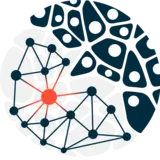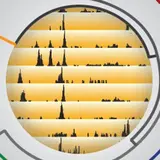Artificial Intelligence in Oncology
- Functional and Structural Genomics

Prof. Dr. Moritz Gerstung
Group Leader
The Gerstung lab investigates how tumours grow and change over time using AI and big data.

Our Research
Cancer develops according to the rules of evolution — mutation and selection. Yet little is known about the timing of this process, the mechanisms by which mutations cause cancer cells to grow and how best to predict and influence the future course of this process.
Understanding these processes requires knowledge of large amounts of information at various scales. A cell’s genome comprises 6 billion base pairs of DNA. Thousands of genetic and epigenetic alterations of the DNA lead to a series of molecular cellular changes in each single cell. Further, tumours are an ecosystem of billions of mutant and normal cells that interact with each other via cellular contacts and signaling molecules.
Charting and modeling this information therefore requires sophisticated machine learning and AI algorithms. The primary focus of the lab is developing such algorithms and carrying out large scale data analyses to understand cancer evolution. The lab is also committed to contribute to generating genomic and molecular data at single and spatial resolution that form the basis of our research.
Specific research projects of the lab involve the establishment of a new spatial genomics platform for data generation and analysis. This will be key for decoding cancer evolution and unlock the secrets of the cancer ecosystem. We are also investigating how our knowledge about the natural history and origins of cancer can be used for early detection and cancer prevention. Lastly, the lab investigates how mutations arise in single cells to understand the very first steps of cancer development.
Our Team
- Show profile

Prof. Dr. Moritz Gerstung
Group Leader
- Show profile

Anna Mathioudaki
PostDoc
- Show profile

Darui Jin
PostDoc
- Show profile

Gleb Rukhovich
Bioinformatician
- Show profile

Nina Wilhelm
Lab Technician
- Show profile

Lilla Pecori
Secretary
- Show profile

Eileen Haage
Secretary
- Show profile

Domenico Calafato
PhD Student
- Show profile

Shuyang Fan
PhD Student
- Show profile

Elyas Heidari
PhD Student
- Show profile

Heng Luo
PhD Student
-

Samuel Philippe Rutz
PhD Student
- Show profile

Artem Shmatko
PhD Student
Friends from other labs
-
Areeba Jamilkhan Patel
- Show profile

Eleonore Boiral
PhD Student
-
Ian Dirk Fichtner
- Show profile

Dr. Clémence Henon
Post-Doc
Alumni
Selected Publications
Shmatko, Artem, Alexander Wolfgang Jung, Kumar Gaurav, Søren Brunak, Laust Hvas Mortensen, Ewan Birney, Tom Fitzgerald, and Moritz Gerstung.
Ritter, Michael, Christina Blume, Yiheng Tang, Areeba Patel, Bhuvic Patel, Natalie Berghaus, Jasim Kada Benotmane et al.
Multi-cancer risk stratification based on national health data: a retrospective modelling and validation study
AW Jung, PC Holm, K Gaurav, JX Hjaltelin, D Placido, LH Mortensen, et al.
Stefan C. Dentro, Sara Vidal-Notari, Swee Hoe Ong, Bartomeu Colom, Kasumi Murai, Charlotte King, Krishnaa Mahbubani, Kourosh Saeb-Parsy, Alan R. Lowe, Moritz Gerstung, et al.
Get in touch with us

